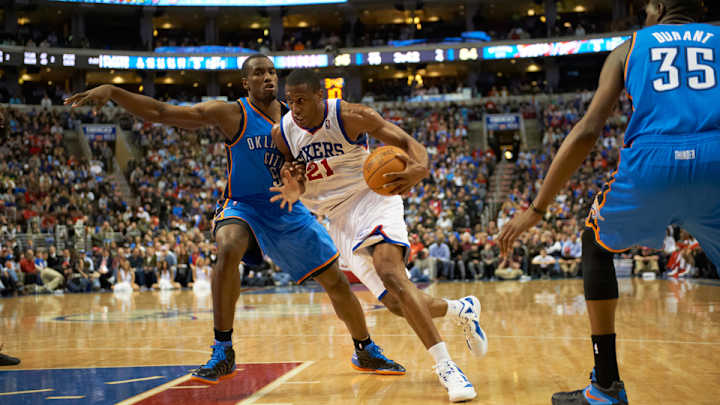Wolves' pursuit of Thaddeus Young comes with its own complications

It's on formality alone that Kevin Love remains part of the Timberwolves. By rule Minnesota and Cleveland cannot agree to terms on any trade that would include No. 1 overall pick Andrew Wiggins until 30 days after he has signed his rookie contract. Yet the two parties are reportedly in as much agreement on a deal built around the trading of Wiggins (along with Anthony Bennett and a first round pick) for Love as the laws of the NBA allow. The trade will likely be consummated on August 23 or soon after, setting up the Cavs as a title contender and the Wolves as a franchise in transition.
Also entangled in these affairs is Sixers forward Thaddeus Young, who could be routed to Minnesota in exchange for Bennett or other pieces as a byproduct. To clarify: There is not yet any firm, reported consensus as to whether Young will be dealt to the Wolves, even to the extent of the mutual understanding involved in the impending Love-Wiggins swap. Still, there's enough smoke blowing about to treat the prospect of fire with some seriousness; Minnesota at the very least has registered interest in acquiring Young, and after picking up Bennett and an additional first rounder would have more pieces with which to entice Philadelphia.
Cavaliers, Wolves get much-needed mulligan with Love-Wiggins trade
Young is a prize of a player, even if he doesn't operate in the way of a traditional star like Love. Some of his finest work comes on defense. Young's transition to the power forward spot has given him a more consistent presence in guarding the pick-and-roll, where his feel for maneuvering in space makes him a bother to opponents at every turn. Seven years in the league (including three under Doug Collins) have given Young an education in team defense, though he also instinctively understands how to snuff out and complicate plays. Young's active hands and intuitive reads serve him well in that regard; according to data from Jeremias Engelmann, Young ranked near the top of the league over the past two seasons in terms of inflating (both directly and indirectly) opponents' turnovers. When Young is on the floor, opposing teams tend to give the ball away.
At the very top of those same rankings is one Ricky Rubio, who could very well be Young's teammate next season. Corey Brewer, also set to play a role in Minnesota's rotation next year, ranks in the top 15. It's not hard to imagine a frenetic Wolves defense that improves on last season's already impressive rate of forced turnovers, fueling a transition game in which Young and Wiggins would be frequent finishers. The addition of defenders as proven as Young and promising as Wiggins should also translate in across-the-board improvement, including a needed bump in the kind and quality of attempts Minnesota allows.
NBA GRADES: Atlantic | Central | Southeast | Pacific | Southwest | Northwest
Young is the perfect kind of cutter to play off of Rubio and flexible in defensive coverage to a degree that would help all involved. It's understandable that Flip Saunders, who both builds this team and coaches it, would covet a player of Young's talents. The catch, however, lies in the root of that interest. Young's acquisition would make the Wolves a better team next season than they would be otherwise, but do the Wolves have any reason to engage in the business of short-term betterment? Adding both Young and Wiggins—among others—to offset the departure of Love wouldn't even get Minnesota to the playoff cusp in the formidable Western Conference, which in effect only highlights how much roster construction the Wolves have left to do.
Offseason grades: Northwest Division
Wiggins could be an eventual star, provided his career unfolds as to befit his draft selection. Otherwise, however, the Wolves have a decent roster that happens to be lacking and somewhat formless; there are quality players and solid prospects, but the pieces don't fit together in a way that signals an eventual contender. What Minnesota needs to complete the picture is transformative talent —the kind that isn't easily acquired without wading deep into the draft lottery. As such, the Wolves might not be best served by selling low on players like Bennett for the sake of adding veterans and making a run at a 35-win season.
On a basketball level, the Wolves' pursuit of Young (who is quite good and very much available) makes decent sense. The potential issues come in the pragmatic. Young is of the age (25) where he could be party to a concerted rebuild, though in his current contract lies a clear pitfall: A player option will give Young the ability to test free agency as soon as next summer, creating a predictable scenario in which Minnesota could give up real assets for a Young rental without the kind of structure that would draw Young to re-sign there next summer.
Therein lies the logical quirk of the entire Young situation: If Minnesota's leadership is confident that it could lure back Young in 2015, why not wait to make the same kind of free agent play when Young presumably hits the open market? Or, put another way: What factor(s) would make the Wolves attractive enough for Young to re-sign there as an unrestricted free agent but not to move there under the same market circumstances? There is a way to express an interest in Young that doesn't welcome the same risk. It simply requires a willingness to ease to a lower win total and a patience that the Wolves may not allow themselves.

Rob Mahoney is an NBA writer dedicated to the minutiae of the game of basketball, its overarching themes and everything in between. He joined the Sports Illustrated staff in 2012.